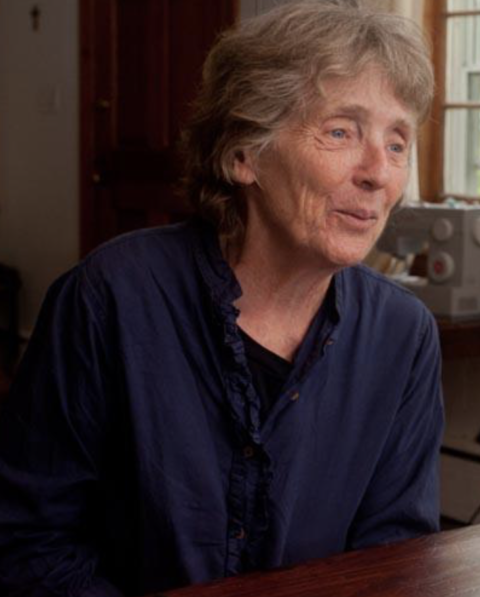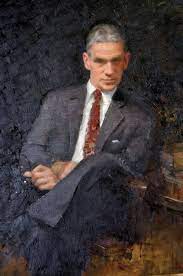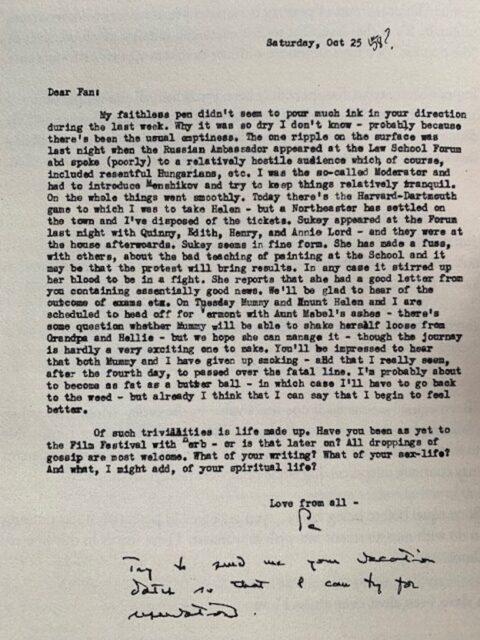Love and I, Fanny Howe’s sixteenth book of poems, includes “Monastic Life,” a penetrating assessment of an entire life, a way of living. Its eighth and final section concludes:
What if the outcome of an act burst into color.
All that fruit skin dimpled from the touch of branches.
The oranges falling when the creatures below were hungry.
What if every part of the created world
Lifted itself up to help the next part.
What if you stood when I entered.
What if you think of time as a long and everlasting plain,
You can pass across it any which way you turn.
And walk around the pond with your father time and again.
 Manimal Woe embodies that unceasing walk with her late father, Harvard law professor Mark DeWolfe Howe. The pond is Fresh Pond in Cambridge. In the lines above, the “what if’s” are both questions and assertions – resulting in provisional, shimmering, unsettled insight. She queries the morality of human acts while preserving a child’s astonishment at the sheer depth and sudden inscrutability of living. Diffidence and a stiffened spine proceed together.
Manimal Woe embodies that unceasing walk with her late father, Harvard law professor Mark DeWolfe Howe. The pond is Fresh Pond in Cambridge. In the lines above, the “what if’s” are both questions and assertions – resulting in provisional, shimmering, unsettled insight. She queries the morality of human acts while preserving a child’s astonishment at the sheer depth and sudden inscrutability of living. Diffidence and a stiffened spine proceed together.
Mainly addressed to her father, Manimal Woe comprises lyric prose, flashes of memoir, meditations, micro-history, quips, lines of poetry, and correspondence between father and daughter. She writes, “The figure in your photo is solitary but in motion like a species of insect with attributes and desires so delicate and without force that few notice it” – a description we could aptly apply to her and her work. The delicacy is not mere fastidiousness; it derives from a long inquiry into, and hesitations about, human motivation and behavior, even as civic responsibility and social justice are emphasized. She quotes his letters throughout the text:
“’Liberty and equality. Are incompatible. This is the first contradiction you need to know. It describes the fault line in American and in its Constitution.’
Had to think about this. Always perplexed by paradoxes, impossibilities, religious matters: was there a trick? If you only knew how many books I have read on theology and philosophy, then you might understand my confusion and poor decision-making.
‘Liberty is for owners. Equality, the masses, or slaves. The troubling underbelly of these concepts is that most labor is equally and inherently unjust. A version of the plantation and prison. And I am not just talking about women, prostitution, cleaning services.’”
 Mark DeWolfe Howe died at age 60 in 1967. A foremost legal historian, he was active in the Civil Liberties Union of Massachusetts, and tried cases in Mississippi in 1965 in support of the Committee. A decade earlier, he had been hounded by Joseph McCarthy’s Commie-hunters. Probing her father’s values by asking him to clarify notions behind such terms as “equality” and “rights,” Howe also assesses the effectiveness of his generation’s efforts. “The year was 1967,” she writes, “and the unofficial conclusion of the civil rights movement would soon end in bloodshed, assassination, and Vietnam. The kind of ‘white liberal’ he represented was on its way out” and “A person of his time and type would no longer be useful to the movements after 1968.” Nevertheless, Manimal Woe seeks continuity with the father’s passions and temperament.
Mark DeWolfe Howe died at age 60 in 1967. A foremost legal historian, he was active in the Civil Liberties Union of Massachusetts, and tried cases in Mississippi in 1965 in support of the Committee. A decade earlier, he had been hounded by Joseph McCarthy’s Commie-hunters. Probing her father’s values by asking him to clarify notions behind such terms as “equality” and “rights,” Howe also assesses the effectiveness of his generation’s efforts. “The year was 1967,” she writes, “and the unofficial conclusion of the civil rights movement would soon end in bloodshed, assassination, and Vietnam. The kind of ‘white liberal’ he represented was on its way out” and “A person of his time and type would no longer be useful to the movements after 1968.” Nevertheless, Manimal Woe seeks continuity with the father’s passions and temperament.
“Pa and I never physically touched each other throughout the years,” she recalls, “not by hand or by cheek … There was still formality between middle class parents and children. You picked up affection by the look in a person’s eyes.” But this isn’t a complaint. The child learned to return the look. She notes the “200 letters he wrote to me in my teens … Their attitude triggered my expectations of a better world.” The expectations were not realized, as she tells her father:
“There is something built into our national system, self-destruction, that goes round and round; repetition without progress; evolution of disagreements. So it goes, stopping at the same stations, having the same scuffles with the same people, scratching down the same punishments and laws only to create a population of government-haters, money-makers, angry nationalists with power, and the rest wage-slaves.”
 Manimal Woe also loosely tracks the events of Fanny’s life – teen camps, marriages, travels, and reading widely – the last of which, “this heap of contradictions,” she admits, “made me a poor student but also a seer of the connections between one thought and another.” The father taught the daughter that the language of the Constitution, that document of glorious rights which never mentions the word “slavery,” also made slavery possible through states’ privileges. So the daughter looks for a force beyond the law (and so, beyond her father) to enact change, “which need(s) the help of minds and spirits much broader and very much more radical in their inclination than the minds of lawyers are likely to be.”
Manimal Woe also loosely tracks the events of Fanny’s life – teen camps, marriages, travels, and reading widely – the last of which, “this heap of contradictions,” she admits, “made me a poor student but also a seer of the connections between one thought and another.” The father taught the daughter that the language of the Constitution, that document of glorious rights which never mentions the word “slavery,” also made slavery possible through states’ privileges. So the daughter looks for a force beyond the law (and so, beyond her father) to enact change, “which need(s) the help of minds and spirits much broader and very much more radical in their inclination than the minds of lawyers are likely to be.”
The father is buried in Mount Wollaston Cemetery in my hometown of Quincy, Massachusetts – where school kids like me were chaperoned on tours of the Adams Homestead and the Dorothy Quincy house. Mark’s father had married Fanny Huntington Quincy in 1899. “Sea-faring men from Bristol, Rhode Island, the DeWolfe’s were mad slave-traders,” Howe writes, “To keep ‘DeWolfe’ was also to confess your sinful place in American history, not to hide from it.” I wonder what they teach those Quincy middle-schoolers today.
But Manimal Woe isn’t a screed about “the manimals we are today, pushing, bitching, lying, insinuating, measuring, bullying, and demanding pay for the labors of others.” Its more speculative dimension, I admit, is the one that lights up my brain:
Life folds over, or turns another way.
No wonder we are so estranged from each other.
[Published on June 6, 2021 by Arrowsmith Press, 96 pages, $21.00 paperback]